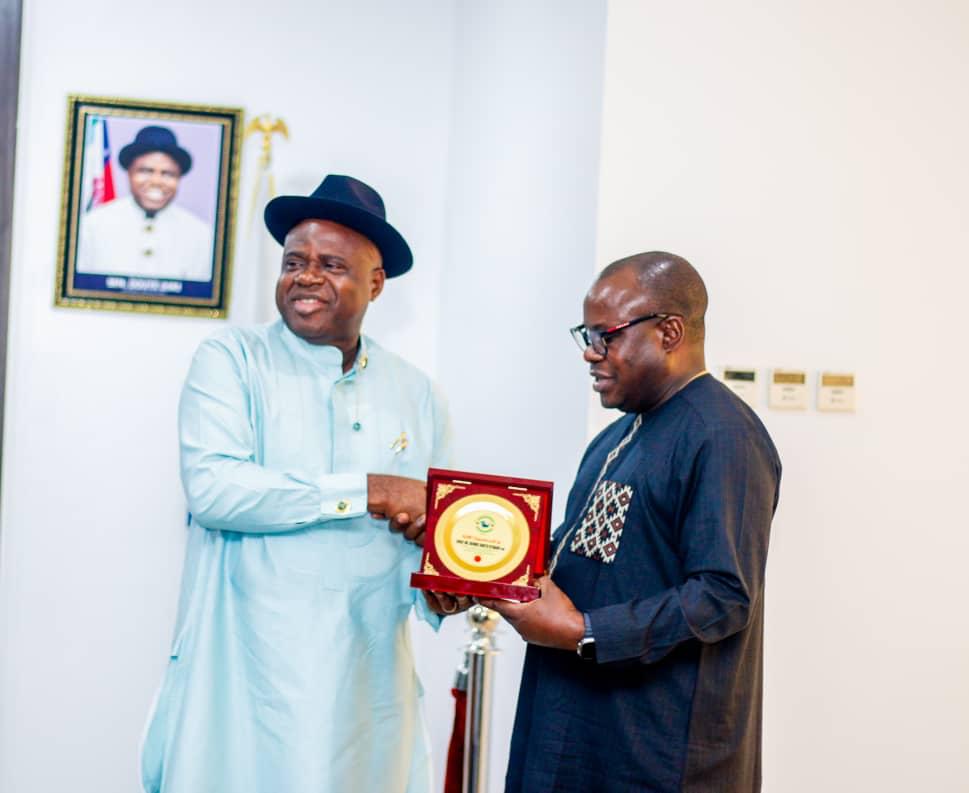NEWS
Funding Critical for Successful Amnesty Programme – Diri

Gov. Douye Diri of Bayelsa has called for better funding of the Presidential Amnesty Programme (PAP) for it to function, effectively.
Diri made the call on Friday when he received the PAP Administrator, Mr Dennis Otuaro, and his delegation in Government House, Yenagoa.
The governor, who stressed that funding was critical for the survival of the programme, called on state governments and National Assembly members from the Niger Delta to collaborate toward addressing its funding challenges.
He said: “There is no place that will survive without funds.
“These are some of the issues that we as governors can also support you in ensuring that our National Assembly members make the contacts and synergise so that these issues will not be left for you alone to handle.
’’He advised Otuaro to build linkages across relevant state governments within the region to ensure that the programme made meaningful impact.
Diri noted that the Niger Delta Development Commission (NDDC) also faced similar challenges, which had affected its activities.
The Bayelsa governor admonished those calling for the scrapping of the programme, saying the issues that led to its establishment were still prevalent.
According to him, despite the transition to renewable energy, crude oil production still plays a vital role in the nation’s economy.
“In terms of human and natural resources. Over the years, there has been a long cry of neglect and underdevelopment.
“The initial armed struggle in Ijawland fought for justice and development.
“The community called Oloibiri in Bayelsa, where crude oil was first struck in commercial quantity in 1956, is now a shadow of itself.
“Nothing was ploughed back into Oloibiri that brought out all the trillions of naira for Nigeria.
“Amnesty was not a gift to the Niger Delta but to bring succour to a people that had been abandoned,” he said.
Commending the previous administrator for creating training centres across the region, the governor decried vandalism at the training centre in Kaiama, Kolokuma/Opokuma Local Government Area of the state.
He urged the incumbent administrator to revamp it.
In his remarks, the PAP Administrator requested the support of the state government in the area of funding for its training programmes.
Otuaro said the programme was at the rehabilitation and reintegration stage and there was need to consult with all relevant stakeholders to ensure its success.
He noted that from 2014, funding for the programme reduced by half while its scope was expanding, particularly when it had about 1,681 students in tertiary institutions in the country and 38 students studying abroad.
Otuaro said that 98 maritime cadets had been deployed within the country, stressing that there was the need to expand the programme to accommodate business-oriented women stakeholders.
He commended Diri for his administration’s efforts in ensuring that Bayelsa remained peaceful.
He added that ljaw people were happy with the prevailing peace and security in Bayelsa. (NAN)
NEWS
DHQ Rebuts Allegation of Internal Sabotage in Benue Massacre

The Defence Headquarters (DHQ) has dismissed the allegation suggesting that internal sabotage within the Nigerian military contributed to the tragic events in Yelwata, Benue.The Director of Defence Information, Brig.-Gen. Tukur Gusau, in a statement on Tuesday, said the claims were unfounded and not supported by credible evidence.
Gusau said the Nigerian military had consistently denied any involvement in the massacre. According to him, the Chief of Defence Staff (CDS), Gen. Christopher Musa, has publicly stated that the military was not responsible for the killings in Yelwata.“Furthermore, the Nigerian Military has emphasized its commitment to protecting civilians and upholding the rule of law.“There is no credible evidence to substantiate claims of internal sabotage within the military related to the Yelwata incident.“Investigations by independent bodies, including human rights organizations, have not found any links between the military and the perpetrators of the massacre.“The violence in Yelwata is part of a broader pattern of intercommunal clashes in Nigeria’s Middle Belt region, primarily between farmers and herders.“These conflicts are driven by longstanding disputes over land and grazing rights, ethnic tensions, and competition for resources,” he said.Gusau said that while the military had been deployed to maintain peace, the root causes of the violence lied in complex socio-economic and political factors.He added that attributing the Yelwata massacre to internal sabotage within the Nigerian military was misleading and detracts from the real issues at play.According to him, it is essential to focus on addressing the underlying causes of intercommunal violence and to support efforts aimed at fostering dialogue, reconciliation, and sustainable peace in the affected regions.“The CDS has only called for a holistic approach and the need for the cummunities and the security agencies to work closer to address the issue.“He also call on the communities not to hide criminals and also assure them the military ans other security agencies are there to protect lives and properties of law abiding citizens,” he added. (NAN)NEWS
Benue killing: NAF Deploys More Air Assets in Op Whirl Stroke

As part of sustained efforts to restore peace and stability across the North Central region, the Nigerian Air Force (NAF) has deployed additional air assets under Operation Whirl Stroke (OPWS).This is contained in a statement by the Director, Public Relations and Information, NAF, Air Commodore Ehimen Ejodame, on Tuesday in Abuja.
Ejodame said the strategic move had reinforced the NAF’s commitment to enhancing security, supporting ground operations, and reassuring communities affected by banditry, kidnapping, and communal unrest. He said the Chief of the Air Staff (CAS), Air Marshal Hasan Abubakar, conducted a firsthand evaluation of air operations under OPWS, to assess the effectiveness of these expanded efforts.According to him, the visit included a high-level strategic engagement held on Tuesday, at the Headquarters Tactical Air Command, Makurdi.Ejodame said the Chief of Army Staff, Lt.-Gen. Olufemi Oluyede; a representative of the Chief of the Naval Staff, Rear Adm. Olusegun Ferreira; the Commander of OPWS; and the Maritime and Air Component Commanders, alongside other key stakeholders, were part of the meeting.According to Ejodame, critical updates were provided on the current tempo of joint operations aimed at restoring lasting peace across the region.In his remarks, the CAS revealed that the newly deployed air assets had been successfully integrated into ongoing operations, delivering real-time intelligence and precision targeting support.He stated NAF aircraft had continued to conduct surveillance, armed reconnaissance, close air support, and precision strike missions with remarkable success.Abubakar noted that the current deployment aligns with the Federal Government’s overarching mission to stabilise the Middle Belt region.He highlighted the impact of recent coordinated air and ground operations across Benue, Nasarawa, and Taraba States, which have led to the dismantling of several militia camps, bandit enclaves, and criminal hideouts.“These outcomes reinforce our unwavering commitment to protecting innocent lives and supporting national peace-building initiatives.“As long as peace is threatened, our resolve remains unshaken.“The NAF will continue to deliver timely, decisive air support in synergy with sister services, ensuring the protection of lives and properties while advancing our mission of restoring peace to the Middle Belt and beyond,” he said.The Service Chiefs jointly emphasised the importance of synergy among the armed forces and other security agencies, noting that jointness remains a cornerstone for operational success under Operation Whirl Stroke.They reiterated that the ongoing operations are part of a broader goal to create a secure environment where residents can live and conduct their legitimate activities without fear. (NAN)NEWS
Tinubu Reiterates Commitment to Fast-Track Approvals for Viable Projects

President Bola Tinubu, on Tuesday restated the determination of his administration to fast-track approvals for viable infrastructural projects in the country.Tinubu, represented by Vice President Kashim Shettima, made this known at the 2025 Nigeria Public-Private Partnership (PPP) Summit on Tuesday in Abuja.
The president therefore urged private sector partner to be focused and more committed. According to him, what matters to the average Nigerian is the availability of basic infrastructure such as power, roads, health facilities and quality schools. He called for a more strengthened public-private sector partnership that emphasises innovation, efficiency, commitment and integrity above mere capital and investments.” We need more than investment. We need innovation, we need efficiency, and above all, we need integrity.” I urge you to look beyond the risks and recognise the immense opportunity to shape a nation that is not just rising, but ready.“The projects that emerge from this summit must not gather dust on paper or linger in bureaucratic limbo.” We will fast-track approvals for viable projects. We will ensure coordination across Ministries, Departments, and Agencies to enable swift implementation.“We do this because we know that what matters to the average Nigerian is not promises, but power in their homes, roads to their farms, access to clean water, modern hospitals, and quality schools. We must build.” We must deliver. And we must do it together,” he said.He observed that a 21st-century economy cannot be built on 20th-century infrastructure, pointing out that the “old model of public-only infrastructure funding is no longer sustainable.“Our national aspirations far exceed what public budgets alone can deliver. That is why we must innovate, and why we must work together.” We are not looking for investors to carry burdens. We are offering opportunities to create value.” We seek long-term partners who are ready to help us bridge our infrastructure gap with purpose and precision,” he added.Tinubu recalled that his administration, on assumption of office two years ago, was quite aware “that a functional relationship between the public and private sectors would be the magic wand of transformation.”He reaffirmed that the administration was still fully committed to that very public-private partnership that is passionate about delivering sustainable and inclusive infrastructure.” We have strengthened the Infrastructure Concession Regulatory Commission and enhanced its capacity to regulate, superintend, and de-risk PPP transactions.” We are determined to deliver infrastructure that is both sustainable and inclusive. Our economic reforms have laid a stable foundation.” From the removal of unsustainable subsidies to the liberalisation of the foreign exchange regime and the optimisation of government revenues, we have acted boldly and responsibly.“We are streamlining bureaucratic bottlenecks and improving transparency in our project pipelines.” We have aligned our processes with global best practices and investor expectations.”The President urged participants to ensure the event is “remembered not for fine speeches, but for bankable projects, signed deals, and enduring progress.”The Minister of Interior, Mr Tunji Ojo, commended the ICRC for championing game-changing projects across diverse sectors.Ojo noted that with President Tinubu and Vice-President Shettima in the saddle, Nigeria is taking its rightful place in the comity of nations.The Regional Director, Central Africa and Anglophone West Africa, IFC, Dahlia Khalifa, applauded the ongoing reform in Nigeria’s PPP framework.Khalifa acknowledged IFC’s collaboration with authorities across key sectors to achieve the country’s overall objectives and strengthening the existing relationship between the organisation and Nigeria.She added that Nigeria under President Tinubu has demonstrated strong commitments to timely and transparent resolution of disputes arising from PPP projects.Solomon Quaynor, the Vice President for Private Sector, Infrastructure and Industrialisation at the African Development Bank, said the theme of the summit implies that partnerships are not just optional but are essential.He said the infrastructure deficits “demand that the government and the private sector work together in commercially viable PPPs.”Quaynor added that the bank was working with other partners on the Lagos-Abidjan highway project to boost regional economic integration in West Africa.“PPPs are complex long-term projects. They need to be designed properly and designed to survive different political administrations because by their very nature, they are long-term,” he stated. (NAN)


















